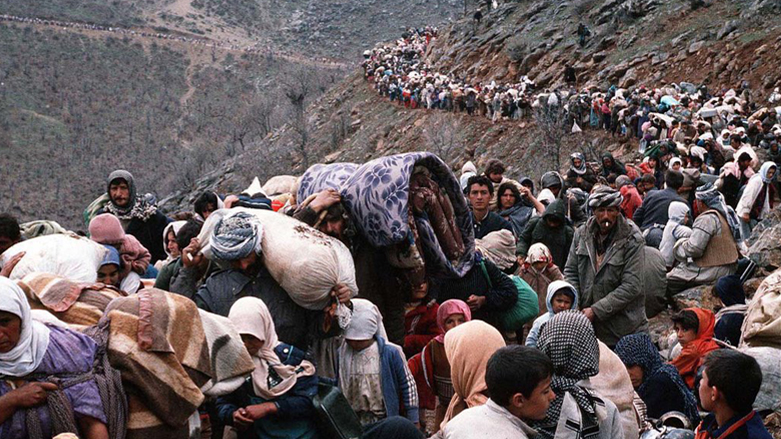KRG welcomes US Senate commemoration of Operation Provide Comfort; Affirmation of ‘strong partnership’ with Iraqi Kurds

WASHINGTON DC, United States (Kurdistan24) The Kurdistan Regional Government (KRG) warmly welcomed the U.S. Senate passage of a resolution marking the 30th anniversary of Operation Provide Comfort, which also affirmed the “strong partnership between the United States and the Iraqi Kurds.”
On Friday, Bayan Sami Abdul Rahman, the KRG Representative in Washington, tweeted her thanks to Sen. Marco Rubio (R-Florida) and Sen. Chris Van Hollen (D-Maryland) for the passage of the resolution the day before.
Thank you @SenRubioPress, Sen @ChrisVanHollen and the US Senate for passing S.Con.Res.16 which commemorates the 30th anniversary of Operation Provide Comfort and reaffirms the strong partnership between the United States and the people of Kurdistan in Iraq https://t.co/0AWswL2pnj https://t.co/cbeTtwbWbM
— Bayan Sami Rahman (@BayanRahman) December 16, 2022
That the resolution was sponsored by a Republican and a Democratic senator reflects the strong bipartisan support in the US Congress for the Kurds. Indeed, it was passed unanimously.
Premises of Resolution: Flight of Kurds after 1991 Gulf War Cease-fire
On Feb. 28, 1991, U.S. President George H. W. Bush shocked the world, as he called a ceasefire in the 1991 Gulf war. Iraqi forces had collapsed, and they were on the run. But when he called a ceasefire, nearly all the Middle East—Arab members of the coalition, Turkey, and Israel—were `stunned.
They believed that Bush had given Saddam a new lease on life and further opportunities for havoc and mayhem. The Israel government even began planning to assassinate Saddam—although that effort was abandoned the next year, after the Labor Party won the elections, and shifted Israel’s focus to the “peace process” with the Palestinians and its Arab neighbors.
Some five years after that war, Bush would explain that he had thought Saddam would be overthrown, after such a crushing defeat.
“I miscalculated,” Bush told the British journalist, David Frost. “I thought he’d be gone.”
But Saddam survived, and his first step was to ruthlessly suppress the post-war uprisings. He unleashed his Republican Guards, which had largely survived intact, against the Shiites in the south and then toward the Kurds in the north.
Bush and his senior advisors had not anticipated that. “I think he took us by surprise,” Bush told Frost.
Indeed, the US had overwhelming military force in the region, and it could have stopped Saddam’s assault. But it did not do so.
Rather, the US military, including the Chief-of-Staff Gen. Colin Powell and the head of CENTCOM, Gen. Norman Schwarzkopf, feared being dragged into a Vietnam-style “quagmire” (the term used then.) Bush’s National Security Adviser, Brent Scowcroft, shared that view.
So, they closed their eyes to the bloodshed in Iraq and waited for the coup they thought was coming.
Read More: The US Watches, as Saddam Crushes the Uprisings: 25th Anniversary
The Senate resolution commemorating Provide Comfort details those terrible days.
“Saddam Hussein’s forces killed approximately 200,000 Iraqi Kurds, destroyed approximately 4,500 Iraqi Kurdish villages, and displaced hundreds of thousands” of people, it said, explaining that they had fled to the borders with Turkey and Iran, “fearing that the regime would use chemical weapons against them.”
“At one point in the early days of the 1991 crisis,” the resolution continues, “the daily death toll of fleeing Iraqi Kurds exceeded 1,000, with victims succumbing to exposure [to the cold], malnutrition, and disease.”
Reversal of US Policy: Operation Provide Comfort; Partnership with KRG against Extremism Terrorism
The Senate resolution does not, however, recount the fierce political battle that emerged in Washington, as some figures pushed the Bush administration to take action. Eventually it did, beginning on April 6, 1991.
Speaking to a webinar hosted by the KRG Representation in Washington, then-Secretary of State James Baker explained the turning point: the brief visit he had made to the Iraqi-Turkish border a few days earlier.
Baker made that trip not at the suggestion of those with the prestigious titles that suggested they understood national security policy, but at the urging of his long-time personal aide, Margaret Tutwiler.
On the mountainous border, overlooking the enormous sprawl of humanity, Baker immediately recognized the problem. He spoke directly with Bush and that produced the sudden transformation in U.S. policy—reversing some of the biggest names associated with that war: Colin Powell, Norman Schwarzkopf, and Brent Scowcroft.
Provide Comfort brought the Kurds back home, down from the mountainous borders to which they had fled. Thus, as the Senate resolution recounts, “In response to the unfolding humanitarian catastrophe,” the U.S. initiated and led Operation Provide Comfort, “delivering humanitarian relief and enforcing a no-fly zone, saving the lives of countless thousands of Iraqi Kurds from near certain death on the freezing and rugged border mountains of Iraqi Kurdistan.”
The resolution also stated that in the three decades since, “The Kurdistan regional government and the Kurdish Peshmerga remain steadfast partners of the United States in the fight against extremism and terrorism.”
Therefore, It is Resolved, that Congress . . .
With the statements above as its premise, the resolution lists five Congressional actions that follow. They culminate in a reaffirmation of “the strong partnership” with Iraq’s Kurds.
Specifically, as the resolution states, Congress:
(1) “Commemorates the 30th anniversary of Operation Provide Comfort.”
(2) “Recognizes and honors the soldiers, diplomats, political leaders, and coalition partners” who implemented Provide Comfort.
(3) “Recognizes and honors the nearly 2,000,000 Iraqis, mostly Kurds, who were displaced by the Hussein regime and who survived starvation and exposure, and for whom Operation Provide Comfort offered assistance, security, and a chance for a new life.”
(4) “Encourages Iraqi Kurdish leaders to continue to uphold the values of democracy, human rights, and freedom.”
(5) Reaffirms (a) “the strong partnership between the United States and the Iraqi Kurds, which exists in complementarity with the United States strong partnership with the Government of Iraq; and (b) the enduring respect and support of Congress for Iraqi Kurds, who continue to stand with the United States in shared opposition to extremism and terrorism.”
